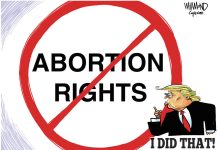It is de rigueur for the current crop of Democratic presidential candidates, including Hoosier Pete Buttegieg from South Bend, to call for elimination of the Electoral College. They blame this venerable institution for their loss in the last election since Hillary Clinton had a plurality of popular votes even though she lost decisively in the college to Donald Trump.
This is prosecution exhibit number one that the system is broken and anti-democratic.
They call for outright election by popular vote, a balloon that has been floated before. In fact, it came up at the Constitutional Convention in 1787 as an early suggestion, one that did not last for long at all. Much of the convention debate revolved around the divide between large states and small states. Popular election frightened the small states, which saw themselves effectively disenfranchised. In the words of Delaware representative Gutting Bedford: “I do not trust you, gentlemen. If you had the power, the abuse of it could not be checked. And you would exercise it to our destruction.”
The large states understood the reason for this fear, so direct popular election was out.
Most of the other suggestions focused on a role for Congress in the election, if not as the electoral body itself. Why? These delegates saw Congress as the epitome of representative democracy. They had constructed it to represent both the voice of the people (House of Representatives) and the states (Senate).
Eventually they found an acceptable compromise that satisfied both large and small states. It was this issue, the president and how he was to be chosen, that took up more time at the convention than any other. The solution was the Electoral College, which gave weight to the more populous states while assuring that the small states like Bedford’s Delaware had significant input. Essentially, the Founding Fathers created an election procedure that would be nation-wide rather than focused only on the largest population centers. It also discouraged the splintering effects of multiple factions and single-issue candidates.
Historically, there have been five elections where the college winner did not get the highest number of popular votes. There have been 19 elections, out of 49 with popular vote counts, where he did not get at least 50 percent all votes, meaning that a majority of voters wanted someone else as president. But a clear winner was known and known early without an excruciating wait while recount after recount took place. Only two times did the Electoral College fail, sending the decision to the House of Representatives where, significantly, each state gets a single vote.
So, what are the options to the current system? Popular vote was quickly discarded at the Constitutional Convention for good reasons, the most important one being that it may have resulted in a stillborn Constitution. Remember that big state-small state divide? No agreement on a Constitution, no United States.
Other alternatives have been offered over the years, more as modifications rather than replacements for the college. Each of these recognizes the wisdom of the Founding Fathers in acknowledging that the United States is a voluntary union of formerly independent states. One that I find most intriguing borrows from the convention’s consideration of Congress’ role by reassigning electoral votes to each congressional district while reserving two votes at large for each state’s Senate seats.
The proponents of this methodology argue it is more democratic (small "d") while not eliminating the republican (small "r") nature of our polity. It preserves the genius of the Founding Fathers who were trying to create a new nation out of whole cloth, all the while bringing 13 disparate and argumentative mini-nations along.
So how would this change have affected past elections? Hardly at all. The only election in the last six that would have changed was . . . no, not 2016. It was 2012, when Mitt Romney would have defeated Barack Obama (that might kill its attractiveness to Mayor Pete and his fellow travelers).
Should this or any other change be made? If this generation truly believes it is smarter than the Founding Fathers, well, I don’t know what to say. Washington, Jefferson, Madison, Hamilton, Franklin — how do the current Democrat candidates stack up against that line-up? Or, for that matter, the 2016 Republican group?
My vote goes to the Founding Fathers, no recount required.
Mark Franke, an adjunct scholar of the Indiana Policy Review, is formerly an associate vice chancellor at Indiana University-Purdue University Fort Wayne. Send comments to [email protected].





